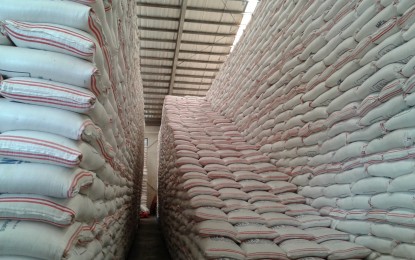
MANILA -- Rice traders and manufacturers urged the government to implement safety measures under the Rice Tariffication Law to address a continued drop in prices of the country's staple grain.
Philippine Chamber of Agricultural and Food Inc. (PCAFI) president Danilo Fausto, in a recent meeting with the media, said the government should protect local farmers who are being hit by the decline in rice prices due to liberalized importation, exportation, and trading of rice.
“In case of extreme and abrupt fluctuation of prices, the Department of Agriculture (DA) should recommend to the Department of Finance (DOF) the imposition of higher tariff,” Fausto said.
Under the implementing rules and regulations (IRR) of the Rice Tariffication Law, a special safeguard duty on rice will be imposed to protect the rice industry from sudden or extreme price fluctuations.
Similarly, the IRR also sets the guidelines on the allocation of the tariff revenues in excess of PHP10 billion. This will be tapped to provide direct financial assistance to rice farmers adversely affected by the new rice import regime.
According to the data from the Philippine Statistics Authority (PSA), farmgate prices of palay dropped 16.4 percent in June to PHP17.88 per kilo.
Prices of well-milled rice also declined to PHP42.92 per kilo from the peak price of PHP49.36 in September 2018.
Retail prices of regular milled rice decreased by PHP7.54 per kilo last month.
In the world market, rice is at USD 417.00 per metric ton (MT) for 5 percent broken rice and USD406 per MT for 25 percent broken.
However, upon entering the Philippines, Fausto said the price has been reported from USD270 per MT to USD350 per MT, therefore sparking allegations that imported rice is being undervalued as soon as it lands on Philippine shores.
To avoid this, it was suggested for the DA to set a reference price on all imported rice, regardless of whether whole rice or broken rice.
Meanwhile, Fausto also proposed for the flexible use of the Rice Competitiveness Enhancement Fund (RCEF), which is a component of Republic Act No. 11203, or the Rice Tariffication Law. particularly for fertilizers and irrigation.
RCEF is funded by tariffs generated by rice imports. The fund hopes to make the domestic rice industry more competitive through farm mechanization, access to better seed, and more financing and extension services, among other measures.
It is allocated as follows:
• 50 percent goes to PhilMech to provide farmers with rice farm machineries and equipment;
• 30 percent to PhilRice to be used for the development, propagation, and promotion of inbred rice seeds to rice farmers and the organization of rice farmers into seed growers' associations engaged in seed production and trade;
• 10 percent to be made available in the form of credit facility with minimal interest rates and with minimum collateral requirements to rice farmers and cooperatives to be managed by the Land Bank of the Philippines and the Development Bank of the Philippines; and
• 10 percent to be set aside to fund the extension services by PhilMech, the Agricultural Training Institute (ATI), and the Technical Education and Skills Development Authority (TESDA) for teaching skills on rice crop production, modern rice farming techniques, seed production, farm mechanization, and knowledge/ technology transfer through farm schools nationwide.
Preliminary data show that the government has so far collected PHP5.9 billion in tariffs from some 1.43 million MT of rice stocks imported by private traders, following the enactment of a law in March.
Customs Commissioner Rey Leonardo Guerrero earlier revealed that the Bureau of Customs (BOC) collected the highest amount of rice import tariffs from the Subic Bay port at PHP1.37 billion.
The Port of Manila collected PHP978.51 million in tariffs, followed by the Manila International Container Port with PHP942.76 million, Guerrero said during a recent DOF Executive Committee meeting.
The Port of Cagayan de Oro collected PHP754.13 million in tariffs from rice imports, while the Port of Davao collected PHP703.93 million, the data showed.
Since PHP27 billion is expected to be raised from tariff duties, PCAFI suggested that the excess of the PHP10 billion should be provided as support for the more essential inputs to rice farming, such as fertilizers and irrigation, as well as support to other farmers pushing for diversification into other agricultural goods.
“This makes the excess of PHP10 billion very flexible, therefore it was also suggested that there should be specification as to how the excess of the RCEF must be utilized,” it said. (PNA)
